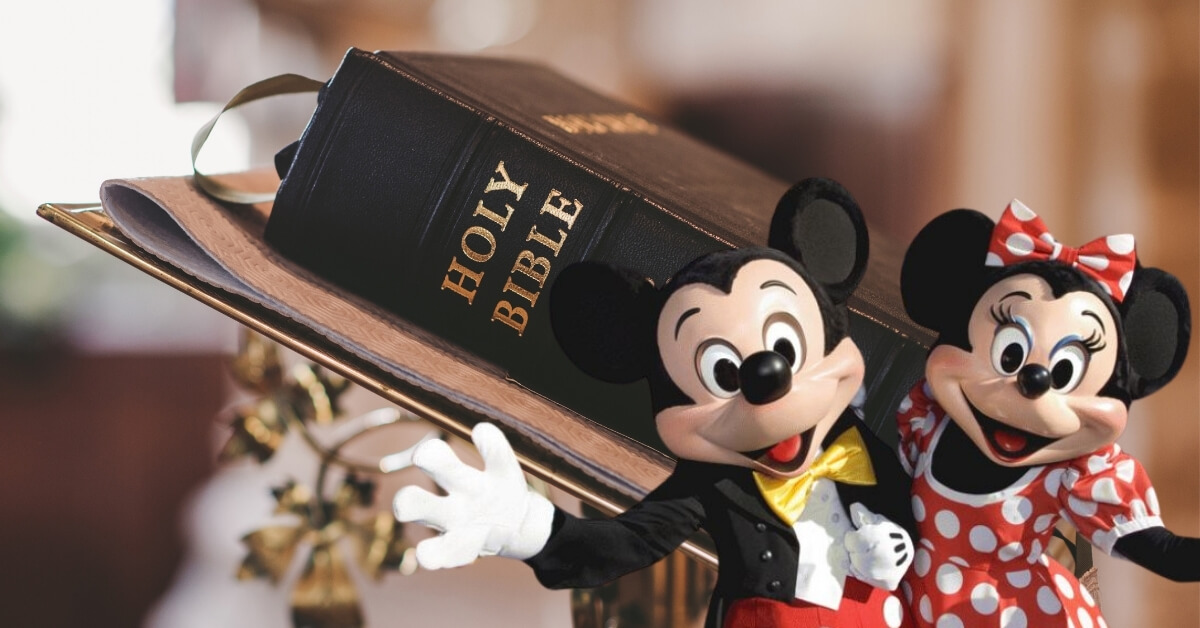Ladies and gentlemen! We are yet again in the swirling vortex of “what-ifs” as the human brain evolves into multiple realms of imagination.
Imagine, if you will, the House of Mouse, known for its princesses, pirates, and pixie dust, laying claim to the oldest storybook of them all: The Holy Bible. It’s the kind of headline that makes you do a double-take, prompting whispers of “Are they even allowed to do that?” and “What’s next, Mickey parting the Red Sea?”
But before we dive into the rabbit hole of copyrights and celestial rights, let’s pause for a moment of contemplation.
This tale begins, as many do in our modern era, on the digital stages of TikTok and X (formerly Twitter), where influencer @claretas.voice sent shockwaves through the ether with a claim that could rival the parting of the Red Sea. According to her, Disney had shelled out a divine $7.2 billion to own the Bible, aiming to transform sacred scripture into a binge-worthy series.
But in the world of instant information, where facts are often stranger than fiction, one must wonder: Has the entertainment behemoth really added the Good Book to its kingdom, or is this another tale spun from the looms of parody and satire?
No, Disney has not acquired the rights to the Holy Bible. The truth is religious texts like the Bible are public domain, making the notion of buying exclusive rights a moot point.
However, the copyright to the NIV (New International Version) Holy Bible is owned by Zondervan, the largest Christian publisher in the world. This company is listed under HarperCollins and is owned by NewsCorp, which rings a bell with FoxNews and others.
So, basically, you might say that Mr. Rupert Murdoch owns everything, including the Bible rights.
The Gospel According to Mickey?: Fact-Checking The Divine Rumors
Behind the laughter and disbelief that such a rumor could even exist, there’s a kernel of truth to the idea that stories, even those as ancient and revered as the Bible, are ripe for reinterpretation.
Disney, with its vast empire of storytelling, has not bought the rights to the Bible. Still, the notion raises fascinating questions about ownership, interpretation, and the modern retelling of classic tales.
The rumor, it seems, found its roots in the fertile ground of satire and parody, with websites like The Babylon Bee and The Return of the Modern Philosopher spinning yarns of Disney’s biblical ambitions.
From claims of a third testament to the casting of JK Rowling as the scribe of the new gospel, these stories, while fabricated, speak to the power of narrative and the endless human appetite for reinvention.
But what of the rights to the Bible? In reality, various versions of the text are indeed owned by commercial entities. For instance, the NIV version falls under the purview of Zondervan, a branch of Harper Collins, while the King James Version is a jewel in the crown of the British Royal Family.
Yet, these copyrights do not hinder the production of biblical stories, as the core of these sacred texts remains in the public domain, free for all to share and adapt.
This saga also sheds light on Disney’s real projects, which, while not divine in nature, sometimes dance on the edge of controversy.
Take, for example, the series “Pauline,” a tale that treads the fine line between creativity and sacrilege, sparking debates and petitions from concerned audiences.
A Question of Faith and Copyright
As we close the book on this celestial rumor, we’re left with more than just a chuckle at the absurdity of it all. It prompts us to ponder the intersection of faith, copyright, and the universal human tradition of storytelling.
Can the stories that shaped civilizations be owned, or are they a collective heritage, transcending time, borders, and even copyrights?
What does it mean to own a story? In an age where creativity knows no bounds, how do we honor the sacred tales of our past while embracing the endless possibilities of our future?
Share your thoughts, spread the word, and let the conversation begin.

